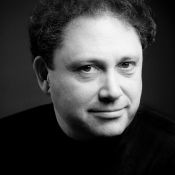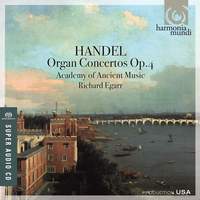Recording of the Week,
Handel Organ Concertos
Following on from last year's triumphant recording of Handel's Op.3 Concerto Grossi, (which won a 2007 Gramophone Award and is this week's Golden Disc) the superb Academy of Ancient Music under Richard Egarr now turn their attention to Handel’s Op. 4 Organ Concertos with Egarr the soloist.
Whereas Bach invented the harpsichord concerto, the organ concerto was effectively Handel’s own invention, allowing him to display his abilities in both performance and composition simultaneously, and from 1735 onwards he started including them in most of his oratorio concerts. These performances were very successful in maintaining Handel’s position at the centre of the increasingly competitive London Musical scene, and his brilliant organ technique came to be regarded as one of the finest in the world.
It is in many ways surprising that Handel was 49 before he wrote his first major works for organ and that no organ fugues, chorale preludes or other organ music in any of the traditional forms can be found among his works. The reason for this is presumably the fact that stylistically Handel was much closer to the Italian secular style than he was to the North German one of his illustrious contemporary Bach. Also, typical English organs at the time were normally without pedals and possessing only very few stops.

In these new recordings out next week on Harmonia Mundi Richard Egarr uses a mid-sized positive organ of English design with a beautifully sweet and characteristically English sound. This is important as I think one of the reasons these works are not more loved is the fact that they are often performed on church organs which are far too large and give the works a completely false northern-Protestant character.
Ultimately, with few exceptions Handel's organ concertos are chamber music to be played on an instrument that will allow virtuosity as well as a lightness and delicacy of sound. The size of the orchestra and the sensitivity of the orchestral players therefore have to match and not overwhelm the organ. Here, Richard Egarr and the AAM achieve this balance perfectly and the results are at times sensitive and moving and at others joyful and dance-like. I was lucky enough to see a video of some of the recording sessions and the fun and enjoyment which they were all having is I can tell you exactly what you hear on the recording. I’ve put an extract below that I think (and hope) you’ll find irresistible!
The Academy of Ancient Music, Richard Egarr (organ & direction)
Available Formats: MP3, FLAC



